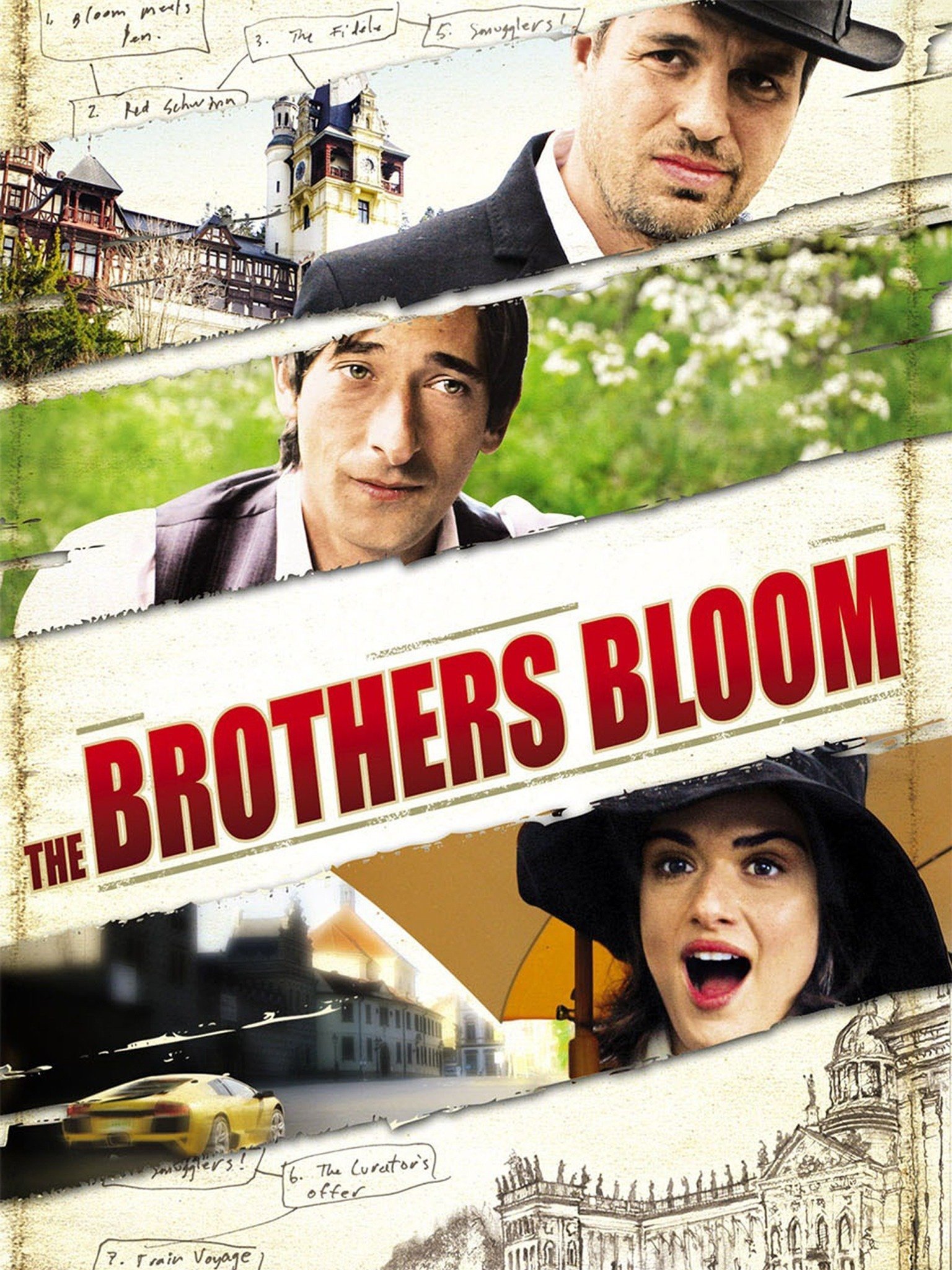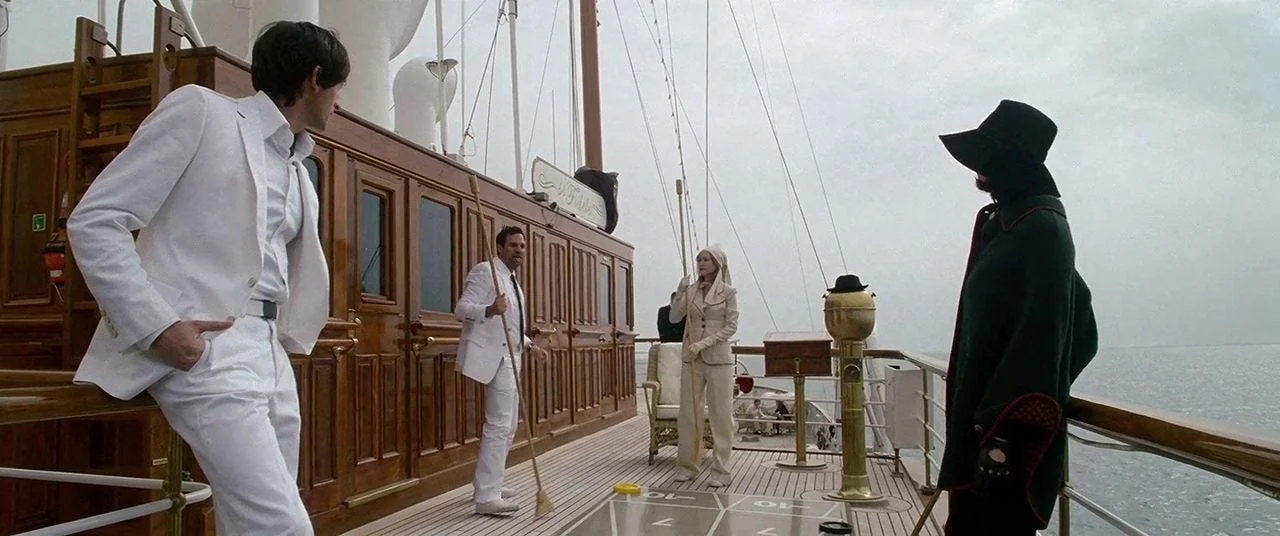After the disappointment of Fountain of Youth, I thought it was time to brave the waters of streaming originals once again with Amazon Prime’s new R-rated comedy Deep Cover. Before I tell you what the movie is about, I want to preface this by saying what I’m about to say isn’t a joke. The London police draft in three improv comics for their ability to think on their feet and roll with the punches to go into a special undercover program. One of said comedians is Bryce Dallas Howard (The Help, Jurassic World), taking a break from directing some of the best episodes of Star Wars television to play Kat, a directionless comedian teaching an improv class as she waits for her big break, which more and more seems like it’ll never come. Rounding out her team is Orlando Bloom’s (The Lord of the Rings, The Outpost) Marlon, an out of work advertisement actor with aspirations for serious drama, and Nick Mohammed’s (Ted Lasso) Hugh, coming off a wonderful run on Taskmaster to play a socially awkward and isolated IT guy at a large London financial firm, desperate for a way to relate to people.
Of course, the idea that improv comics are the perfect choices for undercover operations is preposterous on the level of sending a Pontiac Fiero to space or recruiting a group of deep-sea oil drillers to become astronauts instead of having them teach astronauts how to turn on a drill, but since it’s a comedy, you sort of just roll with it the way they’re supposed to and let yourself become caught up in the shred of believability in the plot. I mean, there is a tiniest bit of something there if you think about it just enough, but not too much. Comedians can be quite quick thinkers—I mean, look at how well Ike Barinholtz does on quiz shows, for example—so it’s not completely out of the realm of possibility, but it is mildly insane all the same. The Armageddon problem still exists; why not put cops through improv classes rather than put improv comics in the field with little more than a briefing before giving them a good luck pep talk and placing them in harm’s way. If you’re able to suspend your disbelief just enough to accept the premise though, you will be rewarded with a very funny comedy with more than enough heart to keep you invested in the characters.
As you can imagine, there are lots of hiccups along the way, and the impulse to “yes, and” their way through scenarios finds our lot of comedians quickly escalating their way along in a local gang run by a fellow called Fly, played by the always excellent and very versatile Paddy Considine (Hot Fuzz, The Outsider), who quickly takes a liking to them and gets them involved way, way over their heads. To be honest, though, the lowest rung on a step stool is over their heads because they’re comedians and not trained investigators. There’s a certain amount of danger that a normal person is subjected to on a daily basis that we sort of shrug off; driving a car, crossing the street, taking a shortcut through an alley, etc., and our plucky protagonists go far, far beyond that. When faced with real danger, the comics act admirably, but there’s a realness to how they react to things once the scene is called. They act heroically when the time comes, but it is just acting. But instead of just playing one on TV, these actors are doing it for real, even if they’re just pretending.
Comedy is often hard to write about—I can tell you that the comedic timing in the film is top, top notch, especially coming from two actors with whom I don’t usually associate comedy. While it is an ensemble cast with three fully realized characters, Bryce Dallas Howard’s Kat is probably the star, and when you look back through her credits, you can’t find a lot of comedic roles (though it is fairly laughable just how bad the Jurassic World movies are, but I don’t think that was intended). But here, she’s as natural as can be. Kat is funny, she’s evenly toned throughout the film, even though she’s the only one who really has to balance her life outside of being an undercover comic/police consultant, she manages to play it without jarring the audience between undercover Kat and real life Kat. I’ve always been a big Bryce Dallas Howard fan, perhaps even more as a director than as an actress now, but Deep Cover has me yearning to see her in more comedies. Orlando Bloom’s washed up ultra-method commercial actor is a far cry from Legolas, and even a completely different kind of character than Will Turner in Pirates of the Caribbean, where he is kind of the straight man as Johnny Depp Johnny Depps all around him. But he plays it with such an earnest bent that he sells it and you buy it hook, line, and sinker because he does such a good job. It’s a feat to pull off this kind of smoldering intensity and over the top commitment for comedy and he just nails it. Now, I can’t say the same about Nick Mohammed—his role here is quite similar to Nate in Ted Lasso, but I don’t mind that one bit when he does it so well. Hugh is definitely cut from the Nate mould, but it doesn’t matter when it’s a role he’s born to play. Not quite as timid or as nervously tight-lipped as Nate, Hugh still struggles to fit in as an IT guy at a high dollar finance firm where not only do the people there not like him, they clearly don’t respect him and barely acknowledge his existence unless they need something from him. He’s so amazing in this role, it doesn’t matter that he’s not playing against type. In fact, based on his Taskmaster appearance, I’m not even sure he’s doing that much acting. But he absolutely kills every frame.
And this is where the movie really shines. It’s not just that it’s funny, of course it is, but lots of movies are funny (well, fewer and fewer, it seems) and it’s the characters that elevate this beyond your average action-comedy. As preposterous as this premise is, as fantastical the plot, the movie is so well grounded in real-life stuff. Kat had a dream that isn’t working out and at 39, she’s desperately trying to figure out if there’s still time left for her to pursue that dream or whether she needs to drastically reconsider her life choices. Marlon wants nothing more than to be taken seriously, but, like Hugh Grant’s character from Paddington 2, his iconic role in an ad has taken over his entire career (though unlike Grant’s has-been, Marlon is a never-was). Hugh is struggling to find a way to exist in a social world where he’s at the bottom of the hierarchy and he wants to do more and be more than he is. Who can’t relate to that? I think one of the things that makes this movie work so well is that each of the protagonists is extremely relatable in one way or another and if you don’t see at least part of yourself in one of them, you’re sure to see it in one of the others. And unlike some of the recent streamer original films, Deep Cover has a star-studded cast and uses them all very well—unfortunately, there’s no Stanley Tucci this time, but Sean Bean (Lord of the Rings, Ronin) doing his best Jackson Lamb impression as the cop who brings them into this program, Sonoya Mizuno (Ex Machina, Devs), and Ian McShane (John Wick, Deadwood) round out the very talented cast and give the shady underworld our protagonists are jumping into much more real feel than it has any right to be. And, at just 1 hour and 39 minutes, the movie hovers around that near-perfect 90 minute mark for comedies, returning us back to form from the 2+ hour movies that marked the Judd Apatow comedy era of the mid-to-late 2000s.
What’s even more surprising about Deep Cover is that it focuses very heavily on friendship and the relationships between the characters as human beings and in a very rare move for an R-rated comedy, doesn’t go all-in on raunchy comedy, sex jokes, or otherwise easy comedic mechanics. There’s barely even a romantic subplot, which again, feels nice after how often we see it shoehorned into movies (not to beat up again on Jurassic World, but it deserves it, it’s a perfect example of “Well, they’re both good looking and the stars of the movie, so they have to get together”). It’s not that it bothers me, but it is an easier route to getting laughs and doing it without that shows off the skill in the writing and acting that bit much more than a comedy like Let’s Be Cops, which I also really enjoyed (despite it dismal reviews, but I do have a fondness for Jake Johnson and not just because he liked one my tweets about an deep cut TV-friendly dubbing of a line in Die Hard 2) or 21 Jump Street. This movie felt like an elevated version of Let’s Be Cops and 21 Jump Street in some ways, but done in a way that you could almost watch with your family, bar some bloody violence and swearing. I’m not saying it’s a replacement for Bluey, but you could easily watch this with older kids. I mean, if the family barbecue gets rained out, this is one you can put on and not worry too much if the kids walk in while the adults are watching.
Deep Cover proves that while dying is easy and comedy is hard, not dying can be pretty hard too. And also very, very funny and satisfying to watch. I highly recommend this one. Great R-rated comedies that are grown-up and mature in the writing are rare in the time of major film franchises replacing both the action movie and the comedy, and this is a movie that deserves to not only be watched, but celebrated. It’s such a refreshing experience after movies like Fountain of Youth, Electric State, and The Gorge, which did a great deal of damage to the reputation of straight-to-streaming films, nearly undoing the great work of Rian Johnson’s Knives Out and Glass Onion. And in a world that can, at times, feel like it’s crumbling around us, it’s nice to be able to escape that for a just over an hour and a half, laugh for a bit, and remember that even while all this is going on, our smaller struggles are still our struggles and it’s okay if we need to focus on them—and on ourselves—for a little while. Not every story has to be the biggest story in the world and if you need a break from the world, a movie like Deep Cover is a wonderful way to take that break.


















